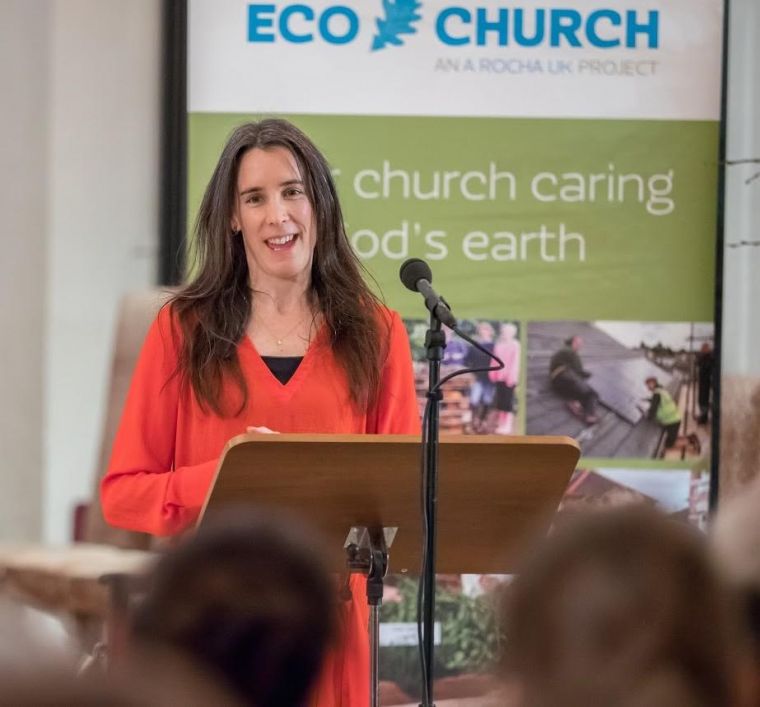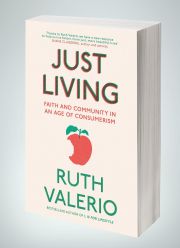Just Living: What does following Jesus look like in the 21st Century?
God created man in his own image; it is undeniable that humans have a particular position in the order of creation. However, God also created the world, and remarked that it was very good. What if worshipping God looked like serving His Kingdom, and not just the people living in it?

Every Christian has to work out what it looks like to follow Jesus; this task requires us to both examine our theology, but also the culture in which we live. Each generation must respond to particular challenges posed by their context.
We are living in a globalised world, dominated by consumerism. Environmentalist and theologian Ruth Valerio's new book Just Living asks the question, how can Christians live well in such a society?
She spoke to Christian Today about how we can engage with, but not be engulfed by, the world around us.
Your doctoral thesis, on which Just Living is based, looked at simplicity and consumerism. How did these issues become so important to you?
Every Christian is faced with the question: "How do I live well, as a follower of Jesus, in the culture that I live in?" And we live in a globalised, consumerist culture, so we can't look at how to live without looking at the context in which we live.
My interest was never in consumerism itself, but in how to worship God. And then that lead me to realise that I couldn't look at these things without looking at the context in which we live.
It was issues of justice and the fact that, as Christians, we are called to respond to them. From that, I realised that you can't think of human issues without thinking about where we live, so the environment was brought into the picture. And as I read my Bible I realised that looking after God's people and looking after His earth are central themes. So, if I want to worship him, part of that has to be about looking after the kingdom for other people and for the whole world that he made.
Politicians seem to have a lot to say about the environment and climate change, but does God care? What does the Bible say?
It is crucial that something makes sense biblically, and on this issue there is no question. Simple living is not about jumping on a secular bandwagon.
If you believe the world was made by God, that is is very good (Genesis 1:31) and he placed us in the garden to look after it (Genesis 2:15) and that we have been made in his image (1.26-28), then the case is closed.
However you believe the world came into being, whether in six days or evolution, what we can agree on is that God was behind that process and that he created it very good .So we live in a world that is good. We live in a world that God loves and has asked us to look after. Part of loving God is about loving the things that he has made, human and otherwise.
There's a call for us to step up to the plate as church and become leaders in just living. Think back to the early church and how they lived. They were known as being the ones who looked after not only their own poor, but other people's poor.
If it is so central to a biblical worldview, why don't Christians seem to care about it?
Because we have our theology incorrect. We have been wearing glasses that are exclusively human. So we see everything through a human lens. For example – God's covenant with Noah in Genesis 9: we always talk about it as God's covenant with Noah, but if you read it, the words are: "this is the covenant I am making with you and all living creatures."
Similarly, John 3:16 does not go: "for God so loved people", but "for God so love the world." It is not just people that are important to God.
People are important, but the Bible has a broader vision: it's about taking off this pair of glasses that gives us an exclusively human theology and putting on another pair that has a biblical, broader vision.
Even if you keep your human focused glasses on, and look at social justice, you cannot be interested in social justice without being interested in the environment. The two go hand-in-hand.
God is interested in how we live in relation to him, to other people and to the wider natural world. This has an impact on our well-being, as our relationship with ourselves is not divorced from those other areas.
So, when we think about consumerism, it can be harmful because it distracts us from those relationships and teaches us to look for happiness through having things, but happiness truly comes from the depth of our relationship with God, our relationships with others and how we relate to the world.
Academia and activism are often kept separate, however you promote living out what you teach. Why is that?
For me it has always been obvious that you hold the thinking and the action together. So I am a thinking activist or an active thinker, I'm not quite sure!
Theology is worthless if it doesn't lead to action. So our theology and our practice always go hand-in-hand. Similarly, we don't want to do things in an un thought-through way.
We have to start with ourselves. We can't campaign and talk about this stuff unless we are doing it ourselves.
Why don't we do it?
It is hard. Living in consumer society is like wading through treacle. It becomes so much a part of the way we live, that we are almost unaware of it and how much life its sucking out of us. To do things differently can be a challenge. It is fun, but it does take effort.
So should we just give everything up?
In one word, no.
We live in a good world created by a good God with good things in it for us to enjoy, but there wrong where we enjoy them at the expense of other people and the wider world.
We need to hold a tension between a full scale embrace of materialism and consumer culture and a complete rejection; we must hold the tension between loving the material things too much and not loving them enough. Those extremes are ones that Christians have fallen into throughout history.
Living well is about walking a middle way between those things.
What can we actually do?
There is not a definite answer about how to do that, but it is more being aware that those extremes exist, checking on them and walking with other people so that we can check on those together.
1. Food
Change your diet, so that its predominately vegetable and grain based, with a little bit of meat and fish in there. It's not vegetarian, but shifts the balance away from meat.
2. Energy
Switch your energy supplier to one that supports renewable energy.
3. Travel
Have a look at your travel and see if there is one area of your travel that you could change. For example, if you regularly fly abroad, don't – maybe limit it to once every five years.
4. Clothes
Clothing is the most difficult area and I'm not sure I've cracked it. I don't think there's any difference ethically between big chains or small boutiques, the difference is in the philosophy of the company.
If you choose not to support a particular shop, make that decision count by then contacting them and letting them know about it, otherwise it is a bit of a wasted action.
I am just one person – what difference can I make? Isn't it enough to just give to charity?

Crucially, it doesn't have to be either or; it's not about whether you do this or whether I do that – do both.
Yes, me deciding not flying on holiday really won't make a difference but if we all do, it will. The fair trade movement is an example of that.
However, Jesus offers an alternative way of looking at this: the point of just living is in part about effectiveness, but not entirely.
It is partly just about asking the question: "As a follower of Jesus, who wants to look after all that he has made – both human and not human – what is the right way to live?", whether it makes a difference, or not.
Ruth Valerio's book Just Living, published by Hodder and Stoughton, is released today. It is available at valeriobooks.com. Ruth also writes at ruthvalerio.net.











